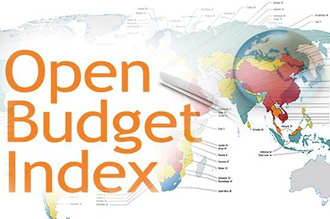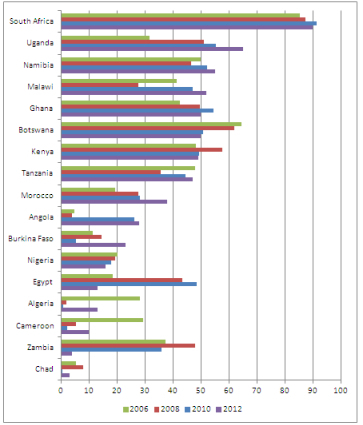
The International Budget Partnership (IBP) released the 2012 results of the Open Budget Index (OBI) in January 2013. The Open Budget Survey measures the state of budget transparency, participation and oversight in countries. The OBI is a list of multi-stakeholder choice questions that are completed through a consultative and verified process. Once completed, a composite score is calculated for each country, with 100 being the highest score possible. The OBI undertakes the survey every two years; the first took place in 2006.
On average, Sub-Sahara Africa scored 31 on the 2012 OBI, which is below the average score of 43 for all regions. The Middle East and North Africa grouping has an average score of 18. These performances mask varied scores within the continent.
Out of the 30 surveyed African countries (both North Africa & Sub-Saharan Africa):
- 14 countries provided scant or no information to the public in its budget documents during the year (Algeria, Benin, Cameroon, Chad, DRC, Egypt, Equatorial Guinea, Niger, Nigeria, Rwanda, Senegal, Tunisia, Zimbabwe and Zambia) and 5 countries provided minimal information (Angola, Burkina Faso, Morocco, Sao Tome and Principe, Sierra Leone). In other words, over half of the countries surveyed on the continent are in the bottom two categories of the OBI index.
- 9 African countries provide some information. This group includes Botswana, Ghana, Mozambique, Namibia, Kenya, Liberia, Mali, Malawi and Tanzania.
- South Africa is in the top performing category, in which countries provide extensive information to the public in its budget documents. Despite South Africa’s score falling by 2 points since 2010, it remains the second highest ranked country in the OBI after New Zealand, and ahead of the UK, France, Sweden and Norway.
- Uganda follows South Africa as the second best performing country in Africa. With a score of 65, it is in the category of countries that provide significant information, along the likes of Germany, Spain and the US.
Encouragingly, on average, the scores from the surveyed countries from Francophone West Africa doubled since 2010 from 8 to 16.
Amongst this group, Burkina Faso is one of the two greatest improvers in Africa over the period. Burkina Faso’s score jumped by 19 points, as it started publishing the pre-budget statement and the in-year reports in a timely way and increased the comprehensiveness of the executive’s budget proposal.
In Mozambique, the score of which jumped by an impressive 18 points, the progress was led by the executive’s budget proposal and the pre-budget statement being published for the first time. As highlighted in the recent CABRI Report “Fiscal Transparency and Participation in Africa: A Status Report” (October 2012), quick gains are possible in many countries, for example by making already produced key budget documents publicly available.
Some countries however registered dramatic declines in scores between 2010 and 2012. The scores of Egypt and Zambia fell by 36 and 32 points respectively over the period (see the table below, which plots OBI scores for those countries which have been surveyed since 2006).

This decline in the OBI score is mainly the result of the non-publication of the executive’s budget proposal or the fact that it is available only at a high price. In Egypt’s case, the mid-year review was also not publicly available and in Zambia’s case the year-end report was available but only at a high fee. This demonstrates that transparency gains are not always sustained but can indeed be reversed, due to various factors such as political instability or transparency practices not being enshrined in law.
In several African countries, the transparency score has remained flat or near flat over many years, such as Ghana, Kenya, Nigeria and Cameroon.
The 2012 survey included a new section on public engagement in the budget process to assess the extent to which the three main institutions surveyed provide spaces for public participation in budget processes. The section includes six principles, including that public engagement should occur throughout the budget process, with all parts of government and should have a legal basis. This part of the survey identified interesting developments for participation in Africa. For instance, the OBI report mentions the Botswana “budget pitso” initiative, a consultation forum system for the public. In Kenya, the constitution stipulates that a parliamentary committee should seek participation from the public.
The report also underlines the fact that countries in which legislatures and SAIs are weak, are also countries where there is little budget transparency and few opportunities for public participation, implying that the overall system of budget governance is deficient. In Africa, Angola, Cameroon, Tunisia, Zimbabwe, Morocco and Equatorial Guinea are characterised by this combination of factors.
The Open Budget Survey 2012 report draws further recommendations on how to improve budget transparency and participation. For more information, please access: internationalbudget.org
CABRI, the IBP and the World Bank Institute will be jointly working with up to four African countries to undertake peer reviews of budget transparency and participation in the next three years. For more, see link past blog post.
Emilie Gay